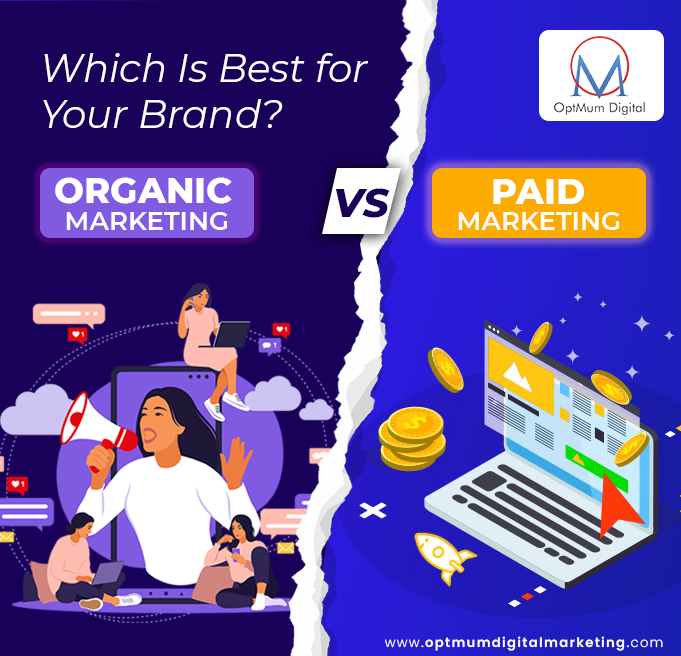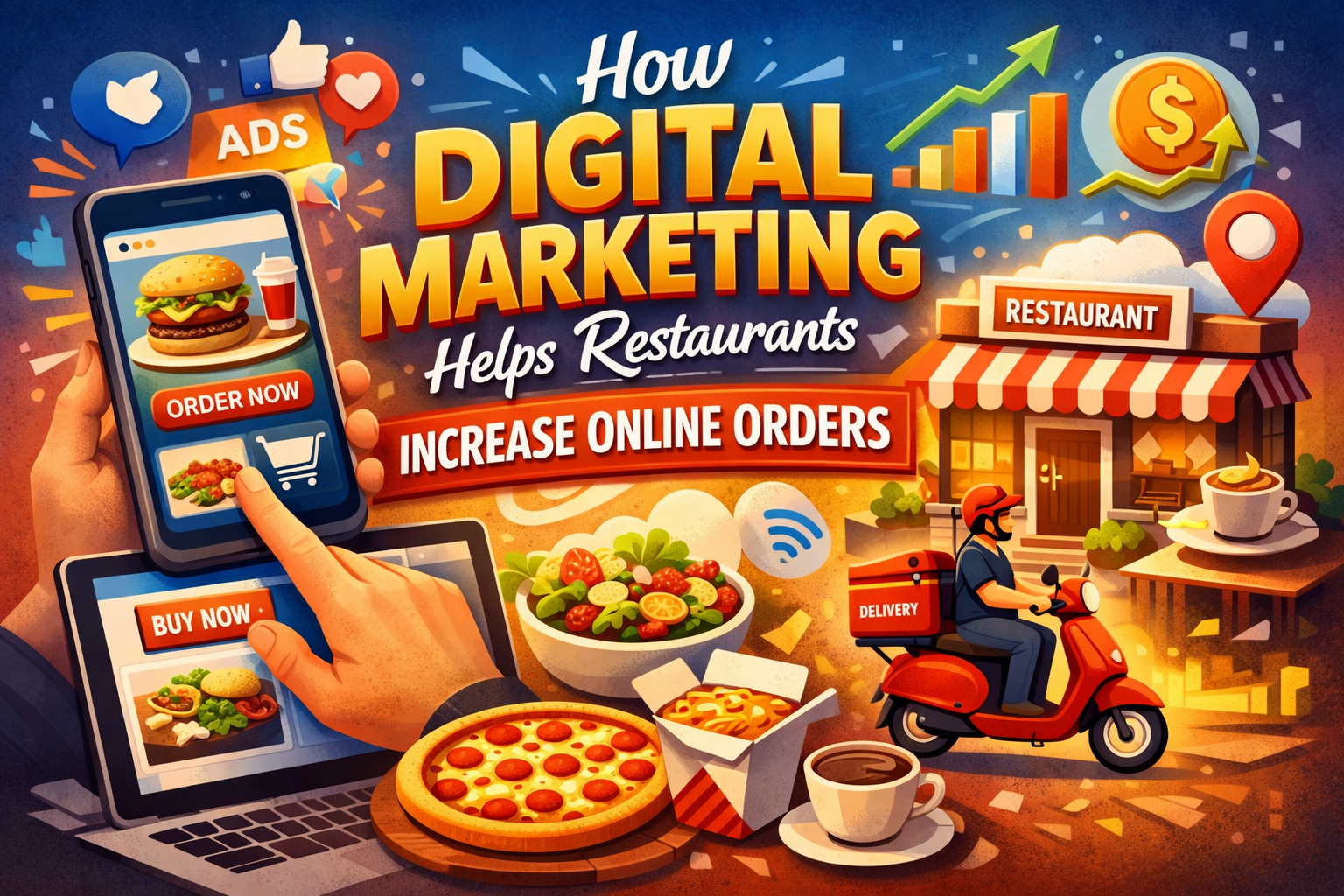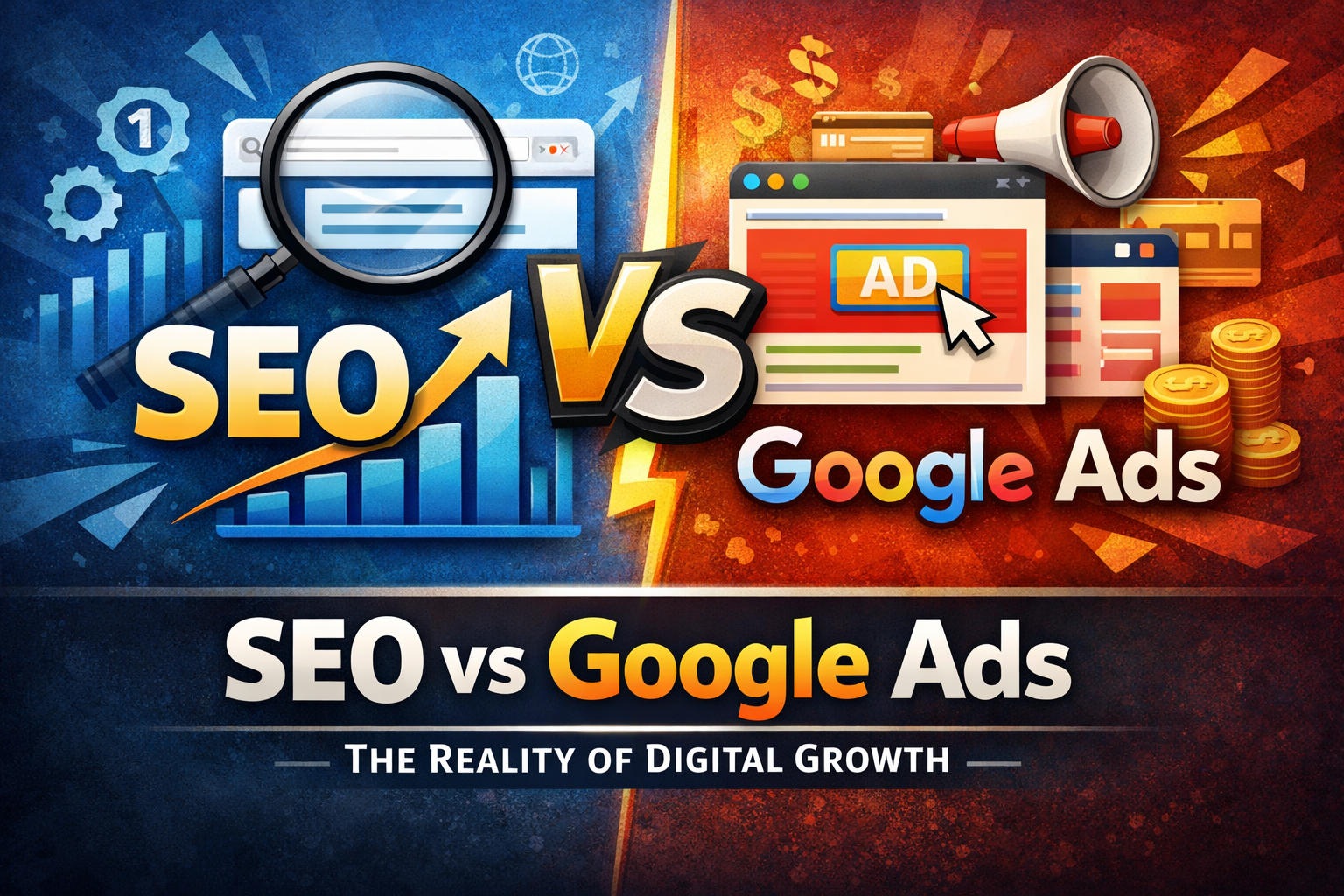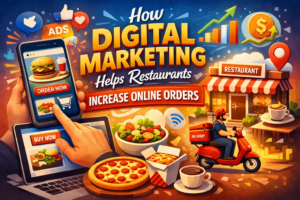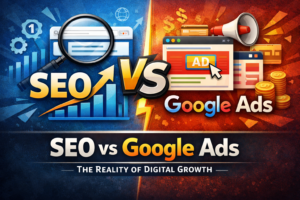Today’s digital landscape is highly competitive. Brands as a result constantly face the dilemma of deciding between Organic VS Paid Marketing, to craft a successful marketing strategy. Which one is best and provides sustained value for money? Both have their benefits as well as drawbacks.
ORGANIC VS PAID MARKETING
Knowing the key differences between Organic VS Paid Marketing is important. You will be in a better position to make an informed decision. That is, decision about which marketing strategy suits your brand.
Cost
Organic Marketing
- Is extremely cost-effective.
- Needs minimal spend on ad placements. However, you will likely spend more time and require more personal and tools.
- Can achieve results. But they take longer to realize as organic growth s a slower process.
Paid Marketing
- Can scale quickly and realize immediate visibility.
- Requires ongoing investment. Else traffic and leads may dry up.
TIME AND EFFORT
Organic Marketing
- Requires more time and effort with consistency. This is due to the use of organic methods.
- Shows more time to deliver results in Content Marketing and SEO; and growing a social media presence.
Paid Marketing
- Can deliver results faster. But they require constant optimization and budget allocation.
- Requires adjusting budgets, testing ad copy, refining targeting, and measuring performance regularly. This is to ensure you’re earning the best ROI.
LONGEVITY
Organic Marketing
- Results tend to be long-lasting. Whether it’s high organic rankings or strong social media engagement.
- Can attract continual traffic or leads once you rank highly in search engines or have built a following. You need not have to pay for it.
Paid marketing
- Earns visibility and traffic quickly during the campaign. If you nurture the leads properly they tend to have a longer lasting impact.
- Results generated are temporary. If funding is stopped for an ad campaign, results in most cases will disappear.
TARGETING
Organic Marketing
- Tends to attract a wider segment of audience. Your campaign content and SEO efforts play a key role in targeting specific segments.
- Ensures the benefit of organic social media marketing. However targeting a specific audience is limited compared to paid ads even if you rely on your followers and their networks.
Paid marketing
- Provides for highly targeted campaigns. This helps you to reach specific demographics, locations, preferences, and behaviors.
- Ensures precise targeting. This can lead to more qualified leads and also higher conversion rates.
TRUST AND CREDIBILITY
Organic marketing
- Tends to build more effectively trust and credibility. It focuses on delivering value and fostering connections.
- Ensures your brand is more likely to be seen by people as trustworthy. That is, people who find your brand through word-of-mouth or content or organic social media marketing.
Paid marketing
- Can be highly effective in producing leads. However, it may not be able build the level of trust similar to that generated by organic methods.
- Can make users more skeptical of an ad. This can be especially so if it does not align with their interests or people feel it is too pushy.
FINAL VERDICT
Which is better – Organic VS Paid Marketing? Both have their own brand of merits. In many cases, combining their strategies will significantly help to elevate the overall credibility of the brand.
Organic Marketing is ideal for businesses
- Who have the time to build relationships’ and nurture an audience over time.
- Whose brand has a powerful story or educational content that resonates with their audience, to share.
- Who look to build long-term, sustainable growth without needing to spend on ad continually.
- Whose business operates in a niche segment with a highly engaged community, a community that values organic interactions’.
- Who can commit to ongoing content creation and social media engagement.
Paid marketing is ideal for businesses
- Who demand immediate results or are launching a new product or service.
- Who have a clear target audience that can be reached precisely through paid campaigns’.
- Whose business has a budget to test different channels and scale ads effectively.
- Who want to drive to a specific landing page, product, or offer, user-traffic.
- Who look to complement their organic efforts to boost reach and visibility.
COMBINING ORGANIC & PAID MARKETING
The best approach in many ways for most brands is a mix of organic and paid marketing. Organic marketing help build long-term credibility and relationships. Paid marketing on the other hand, help in the short run accelerate brand visibility and drive traffic. Here is how combining both organic and paid marketing can effectively harvest maximum benefits.
- Use paid marketing to test your brand messaging. Paid campaigns can be used quickly to gauge which kind of content, messaging, and offers sync with your audience. Then, later incorporate the gathered insights into your organic marketing activities.
- Boost high-performing organic content. Suppose a part of content is performing organically effectively, consider the use of paid ads to boost it to amplify its reach.
- Build a retargeting strategy. Use paid ads to retarget users. Users who have engaged with your organic content but have not yet converted. This helps to nurture leads and guide them down the sales funnel.
CONCLUSION
Both provide their own set of unique benefits. Your selection choice should ultimately depend on your goals, budget, and timeline. If your intention is to earn swift outcomes and instant visibility, then Paid Marketing will fit your needs. If you’re looking for long-term growth and brand loyalty with sustainable results, then Organic Marketing will be a better choice. A mix of both will in many cases will suit many brands. You can have a comprehensive strategy that fuels short-term success as well as long-term growth. Whatever be your final choice, look no further than OptMum Digital, a leading player in the Digital Marketing landscape. Leveraging its proven expertise in Paid and Organic Marketing, you stand to harvest maximum benefits that’s value for money.
frequently asked questions
There is no specific answer to this question. Both have their own brand of merits. Organic Marketing is cost-effective. It is also sustainable in the long run. However, it often consumes time to deliver results. Paid Marketing on the other hand, delivers swift outcomes. But it needs ongoing financial investment. Both marketing strategies are often adopted by many brands to maximize their reach and impact.
Organic Marketing is more cost-effective. That’s because it does not directly involve direct costs, like paid ads. However, you need to make significant investment in time as well as efforts to produce quality content, optimize for SEO, and build an engaged audience.
Paid marketing, on the other hand, although faster needs ongoing costs. Also, effectiveness of its campaigns depends on how well the ad budget is managed. It also depends on how well targeting and optimization is managed.
Organic Marketing is a long-term strategy. So, results will take time to bear fruit. In some cases, it can take several months to see proper results like audience traffic or audience engagement. This is often based on aspects like SEO efforts, Content Strategy, and Audience Engagement. It takes time to see concrete results.
It delivers quicker results compared to Organic Marketing. Once your ads go live, you can start driving traffic. Else you can start seeing almost immediately conversions. The speed at which the results get delivered is based on your ad creative, targeting, and budget. At the same time, it is essential to optimize continually your campaigns to secure quality ROI.
Yes. It’s possible. By getting them together you can craft a powerful strategy. Organic Marketing helps to build brand awareness and trust for the long term. Paid Marketing on the other hand, drives immediate traffic flow and expands your reach to quicken your efforts. Additionally, paid ads also supports for new campaigns visibility.
Selecting from among the two entirely depends on your business goals, timeline, and budget.
Select Organic Marketing if you
- Have the time and resources to grow and build a long-term, sustainable presence.
- Want to focus on building with your audience trust as well as relationships.
Select Paid Marketing if you are
- Looking for quick results.
- Launching a new product.
- Looking to reach faster a specific target audience.
Several brands use a mix of both marketing strategies and leverage the advantages of both to gain success.
The key metrics for –
Organic Marketing
- Website Traffic.
- Social Media Engagement (Likes, Shares, Comments),
- SEO Rankings.
- Brand Awareness.
Paid Marketing
- Click-Through-Rates (CTR).
- Conversion Rates.
- Return on Ad Spend (ROAS).
- Customer Acquisition Costs.
Both marketing strategies have different ways to measure success. But their eventual goal is to drive customer conversions and fuel growth for your brand.
It depends on what kind of brand yours is. It is best for those brands that can expend time in creating content, SEO, and community branding. Like for instance, brands that have a loyal, engaged audience; OR that focus on building long-term relationships. Paid marketing on the other hand, is suitable for brands in competitive industries; or brands that are looking for rapid growth. They help generate quick results.
It is possible. However, it needs you to spend sufficient time and sustained effort. Your brand can reach more people as your content ranks on search engines and social media grows. However, if you are looking to scale swiftly or target a specific section of audiences, then use a mix of both marketing. They will help realize your goals and growth faster.

